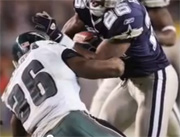
THURSDAY, June 7 (HealthDay News) — The National Football League hid information that linked football-related head injuries to permanent brain damage, according to a massive lawsuit filed in federal court Thursday by lawyers for former players and their families, the Associated Press reported.
The “master complaint,” filed in Philadelphia, consolidates 81 pending lawsuits by plaintiffs who want the NFL held responsible for the care of players suffering from neurological conditions such as Alzheimer’s disease and other types of dementia, the news service reported.
The 81 lawsuits include 2,138 players who accuse the NFL of not doing enough to inform them about the dangers of head injuries. The total number of plaintiffs in the lawsuits is 3,356 and includes players, spouses and other relatives or representatives, the AP said.
One of the plaintiffs is Mary Ann Easterling, whose husband was former Atlanta Falcons safety Ray Easterling. He committed suicide in April at age 62 after suffering from undiagnosed dementia for many years and was often angry, volatile and acted out of character, the news service reported.
The NFL has no idea what the families of affected players have to endure, Mary Ann Easterling told the AP.
“I wish I could sit down with [NFL Commissioner Roger Goodell] and share with him the pain. It’s not just the spouses, it’s the kids, too,” she said. “Kids don’t understand why Dad is angry all the time.”
The long list of former players connected to concussion lawsuits includes the family of Dave Duerson, who shot himself in 2011, and Jim McMahon, Duerson’s teammate on the 1985 Super Bowl-winning Chicago Bears, the AP said.
“The NFL, like the sport of boxing, was aware of the health risks associated with repetitive blows producing sub-concussive and concussive results and the fact that some members of the NFL player population were at significant risk of developing long-term brain damage and cognitive decline as a result,” the consolidated lawsuit charges, the news service reported.
“Despite its knowledge and controlling role in governing player conduct on and off the field, the NFL turned a blind eye to the risk and failed to warn and/or impose safety regulations governing this well-recognized health and safety problem.”
The NFL, which denies any culpability, issued a statement in response to the mega-lawsuit.
“Our legal team will review today’s filing that is intended to consolidate plaintiffs’ existing claims into one ‘master’ complaint,” the statement said. “The NFL has long made player safety a priority and continues to do so. Any allegation that the NFL sought to mislead players has no merit. It stands in contrast to the league’s many actions to better protect players and advance the science and medical understanding of the management and treatment of concussions.”
Dr. Jeffrey Bazarian is an associate professor of emergency medicine at the University of Rochester in New York who has done extensive research on concussions and dementia.
“The magnitude of this problem [in the NFL] is yet to be determined,” Bazarian said. “From work that’s being done among retired NFL players, they have a higher incidence of dementia and Alzheimer’s than the general population. And those problems appear to be related to the number of concussions that they had when they played.”
Among deceased players who have donated their brains, there’s hard evidence that they had traumatic encephalopathy, which is a progressive degenerative disease caused by concussions and other brain injuries, he said.
“This is very unusual in anything else but boxing,” Bazarian said. “To see that in any other sport indicates a link between what they did as players and what happens to their brains later. It’s suggestive [but] it doesn’t prove it.”
More information
The U.S. Centers for Disease Control and Prevention has more about concussions.

